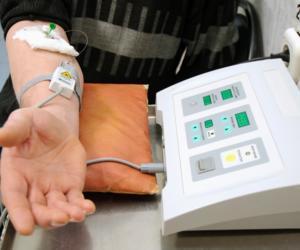The Latest Advancements in Treatment and Research for Rheumatoid Arthritis

Patients and providers alike are often faced with unique challenges when it comes to treatment for Rheumatoid Arthritis (RA). The disease is not well understood, there is no cure, and treatments often require a trial and error process.
Luckily, technology and research are constantly advancing treatments and broadening the options for patients. Treatment options for RA include different types of drugs such as non-steroidal anti-inflammatory drugs, corticosteroids, disease-modifying antirheumatic drugs (DMARDs), and even more recently, biologic agents. The development of drugs that specifically target certain features of the disease is leading to more and more individualized treatment options.
Biologic agents work by targeting specific parts of the immune system that trigger inflammation and cause joint damage. They are usually prescribed in conjunction with a DMARD since this tends to be most effective. Biologic agents are new, and thus we are still learning about them. One type of biologics that has been used to treat RA are called tumor necrosis factor inhibitors (TNF inhibitors). These drugs reduce inflammation and stop disease progression by inhibiting TNF which causes inflammation. In people with healthy and functioning immune systems, TNF is blocked. In people with RA and other autoimmune diseases, TNF can be present in higher levels and contribute to inflammation. Currently, there are 6 different TNF inhibitors that have been approved by the FDA.
New information about why some patients don’t respond to treatment
This November, the Mayo Clinic, a leader in RA treatment and research, is revealing some information about why some patients do not respond well when treated with TNF inhibitors. Their results have found that a certain protein that drives inflammation in RA is responsible for this variable efficacy. The Mayo Clinic presented their results at the American College of Rheumatology annual meeting in San Francisco.
This protein is called type 1 interferon beta, and researchers found that when patients have a higher level of this protein in comparison with another inflammatory protein (type 1 interferon alpha), they do not respond as well to TNF inhibitors. During their research they specifically looked at white blood cells and how they responded in one group of subjects compared to the other. One study group had higher levels of type 1 interferon beta while the other had type 1 interferon alpha. Monocytes, a type of white blood cells that is involved in RA was found to behave differently in one group compared to the other. One of the main features of RA is the infiltration of monocytes and lymphocytes into the synovium in the body’s joints. This process is largely responsible for the development of the disease.
Theresa Wampler Muskardin, M.D., a Mayo Clinic rheumatologist in Rochester Minnesota said that, “Investigating these pathways may identify other targets for therapy or other markers that predict treatment response. It will help rheumatologists find the right drug for each patient and spare patients medications that won't work for them.” Better understanding drugs on the market can help providers personalize treatment more effectively and limit the trial and error process that is so often used when initiating treatment for a patient with RA.
RA affects quality of life for most people with the disease. Simple things such as tying shoes or buttoning a shirt in the morning can become a painful challenge. Not being able to perform usually daily tasks, also known as activities of daily living (ADLs), can have a huge negative impact on mental health. Depending on a person’s job type, RA can impact employment by making certain activities such as typing painful. This can place a financial burden on individuals and families that can make the situation seem more hopeless. People who are unable to perform in their daily life the way that they used to are more prone to depression. This is one reason why better understanding RA and developing more individualized treatment methods is so important. Being able to provide patients with effective treatment methods earlier on, can enable them to maintain their quality of life, and slow the progression of the disease, leading to better mental health outcomes.
Providing hope for patients, families, and friends affected by RA is important in helping them cope with the changes that RA brings into their lives. The Mayo Clinic is working to do just this.
About the Mayo Clinic
The Mayo Clinic has maintained its ranking as a top hospital in the United States for many years. Their mission is “to inspire hope and contribute to health and well-being by providing the best care to every patient through integrated clinical practice, education and research.” They are a non-profit organization that is committed to enhancing clinical practice, providing patient education, and providing “expert whole-person care” for every patient. Rheumatologists at the Mayo Clinic see 20,000 rheumatology patients every year, and treat more than 100 types of arthritis. As leaders in RA management they provide state of the art diagnosis and treatment options. The physicians in this specialty are often involved in clinical research and are thus on the forefront of advancements in the field.
Other research findings presented at the meeting
Mayo Clinic rheumatologists and cardiologist are constantly working to advance prevention, detection, and treatment of cardiovascular problems in people with rheumatic diseases.
Having RA doubles the risk of many heart problems due to the inflammatory nature of the disease. While RA typically attacks the synovium, the thin layer of tissue that lines joints, it can sometimes move to other parts of the body such as the heart and blood vessels. A 2015 study showed that people with RA are more likely to develop atherosclerosis than people without RA, and that it progresses at a faster rate. Additionally, in people with RA and atherosclerosis, the plaque in blood vessels is more likely to rupture and break which is what causes a heart attack. The risk of stroke is nearly doubled in people with RA. More than ever, this information indicates that research and better treatment methods for RA are necessary.
Some of the Mayo Clinic’s other findings showed that:
- Sarcoidosis carries a higher risk of heart disease and venous thromboembolism (blood clots in the veins). Sarcoidosis is another type of inflammatory disease that involves the growth of tiny inflammatory cells called “granulomas” in different parts of the body, most commonly the lungs, eyes, lymph nodes, and skin. The Mayo Clinic researchers found that the season can affect the severity of sarcoidosis with rates being lower in autumn. They said that they believe environmental factors such as unknown substances inhaled in the air can trigger sarcoidosis.
- They found that coronary artery disease (CAD) is 70 percent higher in patients with polymyalgia rheumatica. Polymyalgia rheumatica is an inflammatory disease that causes pain and stiffness particularly in the shoulders.
- Heart and circulatory abnormalities were found to be common in Takayasu’s arteritis. Takayasu’s arteritis is part of a group of disorders that cause blood vessel inflammation. This type specifically damages the aorta.















